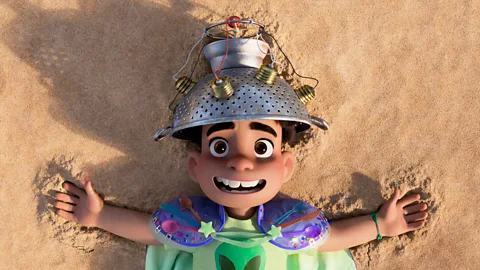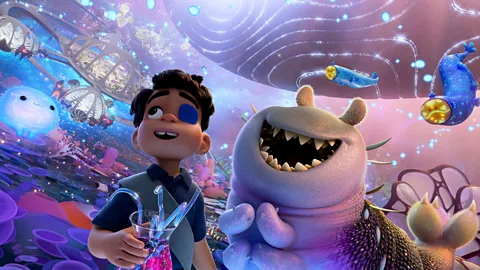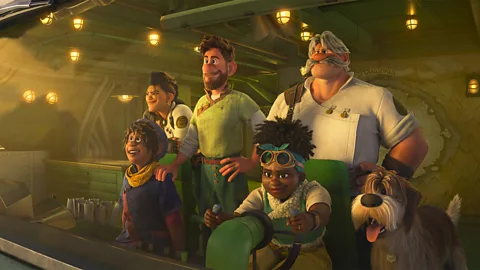Elio and the reason today's original children's films are flopping
 Pixar
PixarPixar's Elio has had the worst-ever box office opening for a film from the animation studio. It's part of a wave of original family cartoons failing at the box office.
In big-time animation studio Pixar's new cartoon, Elio, a boy is beamed up from Earth and into outer space, but the film itself hasn't taken off. The film made just $21m (£15m) at the US box office over its opening weekend, and $14m (£10m) globally, which counts as the worst ever opening of a Pixar film. DreamWorks' How to Train Your Dragon sold almost twice as many tickets, despite having been out for a week already. And even Danny Boyle's shot-on-an-iPhone zombie adventure 28 Years Later pulled in more viewers.
What a difference a year makes. Last June, Pixar's previous film, Inside Out 2, was well on its way to making almost $1.7 billion, and cementing its status as 2024's biggest film worldwide. And it wasn't alone. An article in the Times last December hailed 2024 as "a new era for family films", adding that "the pandemic slump is officially over and a new saviour of the box office has returned to Hollywood". Other child-friendly titles cited in the article were Despicable Me 4, Moana 2, Mufasa: The Lion King, and Sonic the Hedgehog 3, which together had made about $6.85 billion.
But while it's hard to argue with the figures, it's just as hard to ignore that the fact that all of these films revolve around existing intellectual properties. This year, the biggest family films include A Minecraft Movie and live-action CGI remakes of Lilo & Stitch and How to Train Your Dragon. But the crashing and burning of Elio suggests that it's much more challenging for films to succeed if they aren't sequels, prequels, remakes, adaptations of video games, or some unholy combination of the above. When it comes to younger viewers, it seems, it's lack of familiarity that breeds contempt.
 Pixar
PixarThere have been some original children's films that have been profitable recently, including The Bad Guys and The Wild Robot (although both are adapted from books). But what we haven't seen lately is the kind of newly minted mega-hit that sells toys and gets turned into a Broadway musical: the days of such franchise-starting phenomena as The Lion King, Toy Story and Frozen seem to be over. As Brooks Barnes noted in the New York Times on Sunday, DreamWorks' Ruby Gillman: Teenage Kraken and Illumination's Migration both underperformed in 2023. Disney's centenary cartoon, Wish, was another 2023 flop. Disney's Strange World, which was released in 2022, is one of its biggest ever box-office bombs. Pixar's Onward fared poorly in 2020. And two other original Pixar films, Soul and Turning Red, went straight to Disney+.
Some of this can be blamed on the Covid-19 pandemic. In certain cases, films were scuppered by a general decline in cinema-going; in other cases, films were denied cinema releases at all; and people in lockdown got used to watching new films at home. But that's not the whole story – and "story" could be the operative word. The underlying problem with the family films which have failed in the 2020s is that they don't have plots which are clear and exciting enough to grip viewers of all ages and attention spans.
A story with too many cooks
Elio, for instance, is the sweet and lively tale of a lonely boy learning to open himself to friendship, but its narrative rambles all over the place. There are too many scenes before Elio leaves Earth and reaches a psychedelic alien craft called the Communiverse. And then the film packs Elio off to a villain's spaceship. And then he's back in the Communiverse. And then he's on Earth. And then he's in the Communiverse again. And did I mention that there's an Elio clone on Earth for some of the time? It's hardly surprising if younger viewers aren't too sure of what he is doing and why.
The film's origins could help to explain matters. Elio was due to be directed by Adrian Molina, using ideas drawn from his own childhood on a military base, but then last June Domee Shi (director of Turning Red) was announced at the new director; last August, Madeline Sharafian was announced as her co-director; and three different screenwriters are credited. Perhaps this particular broth just had too many cooks. But numerous family films are similarly over-stuffed and over-complicated. It's head-achingly difficult to summarise the convoluted plots of Soul, Strange Planet, Onward and Wish – whereas in the case of Pixar's classic Finding Nemo, the title is the plot.
 Disney
DisneyWhat connects these recent films appears to be a studio's nervousness about letting a writer-director tell a fun, simple story. Animated films are notoriously expensive – Elio is reputed to have cost $150m (£110m) – so there is an understandable impulse to keep refining a scenario, paying more and more writers to add more and more details to its fictional world. But this committee-oriented method isn't the best way to craft a streamlined plot.
"You can feel a need to have another script meeting in which they plot their way out of trouble with another layer of story or another dimension," Jason Solomons, a British film critic-turned-producer, tells the BBC. "Even these lesser films are always extremely thought-out, but in tying up all their loose ends, giving punchlines to every joke, and an arc to every character, sometimes you feel the mechanism creaking, straining to make it all work with the customary almost obligatory smoothness. Maybe a little craziness, a rough edge here and there, would do them the world of good?"
That's not to say that the various sequels and spin-offs which dominate the family-film market are models of economical storytelling, but that's not so crucial when the audience is familiar with the material before the film starts. Viewing habits in the post-pandemic era involve a lot more phone-scrolling and chatting than they did just a few years ago, but cinema-goers don't have to concentrate to follow a remake of How to Train Your Dragon or Lilo & Stitch: they know what's happening, anyway. The challenge for studios now is to engross audiences in stories that they don't already know.
--
If you liked this story sign up for The Essential List newsletter, a handpicked selection of features, videos and can't-miss news, delivered to your inbox twice a week.
